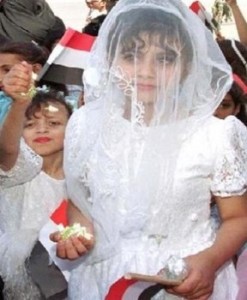To the Parliament
- Enact legislation which:
- sets the minimum age for marriage at 18 in accordance with the definition of a child in the Convention on the Rights of the Child;
- makes those who perform, register, or assist in child marriages liable to criminal prosecution, and establishes fines for the failure to register marriages;
- establishes the principle of full and free consent of both partners to a marriage;
- recognizes marital rape as a criminal offense;
- ensures that girls married prior to the enactment of the new legislation have the option of terminating their marriage and that the husband remains legally obliged to maintain the wife in accordance with prior legal obligations;
- ensures that girls and women who are forcibly married shall have the right to press criminal charges, seek a divorce, and seek alimony;
- ensures that children born to mothers under 18 shall have the same rights as children born in a legally recognized marriage; and
- repeals or amends any Law which violate the rights to enter freely into marriage and to full and free consent to marriage.
To the Ministry of Religious Endowments
- Raise awareness with religious leaders about the harmful health and other consequences of child marriage on the lives of girls and women.
To the Ministry of Health
- Increase and improve access to reproductive health services and information for all girls and women, including access to emergency obstetric care and family planning.
- Expand reproductive health care outreach to rural communities where a large percentage of Yemenis live and where girl marry at younger ages,
- Increase and improve training for birth attendants in rural areas as most girls and women, especially in rural areas, give birth at home.
- Raise awareness that government policy does not require husbands’ authorization for women to seek health care, including obstetric care, regardless of the woman or girl’s age. Ensure that all health care workers are aware that such authorization is not required.
- Provide tailored health information to young mothers about proper nutrition and care for their health and the health of their babies.
- Raise awareness among health workers and the public on the importance of registering births, including home deliveries.
- Raise awareness on the imperative to register all births in the Ministry of Health.
The Ministry of Education
- Develop retention strategies to ensure that girls who enroll in school are able to remain in school, such as incentives for families to keep girls in school and to subsidize the costs of uniforms and textbooks.
- Provide continuing formal education and vocational training opportunities for married girls and women. Ensure that girls who have children are able to attend school.
- Increase the number of female teachers in rural areas as a strategy to retain girls in school.
- Provide or subsidize transportation to and from school for girls living in distant rural areas where nearby schools are not accessible, and where dropout rates and rates of child marriage are high.
To the Ministry of Justice
- Provide training for lawyers, public prosecutors, and judges on gender discrimination and violence against women, including child marriages.
- Raise awareness on the imperative to register all marriages in the Ministry of Justice.
- Ensure that judges report cases of child marriages when reviewing marriage registrations.
To the Ministry of Interior
- Provide training to law enforcement officials on gender discrimination and violence against women, and investigate cases of violence against women and girls.
- After a law banning child marriages is in effect, conduct investigations into child marriages and establish mechanisms (such as help lines) for community members to report child marriages.
- Ensure that the Department of Civil Status within the ministry exchanges information with the Ministry of Health and the Ministry of Justice on the registration of births and marriages, in urban and rural areas.
- Raise awareness about the obligation to register births and marriages through the media.
To Civil Society Organizations
- Develop campaigns on preventing child marriage targeted at children and parents of primary and secondary schools students. Explain the harms the practice causes and the benefits of delayed marriage and childbearing.
- Once a law banning child marriage is passed, establish mechanisms for reporting cases of child marriage, for example via help lines or through collaboration with schools, hospitals, and clinics.
- Assist married children in seeking legal remedies for abuse, financial compensation after divorce, and in continuing their education.
- Develop and maintain dialogue with religious leaders on issues pertaining to the rights of girls and women, including on child marriage.
To International Donors
- Support programs working to address violence and discrimination against women and girls in the school curriculum.
- Advocate for programs that seek to address barriers to girls’ education, such as subsidies for school-related costs and the provision of safe transportation for girls to schools in rural communities.
- Collaborate with the Ministry of Health on ensuring the availability of skilled birth attendants in rural communities and providing transportation to women and girls seeking emergency obstetric care in rural areas.
- Fund programs offering services to victims of domestic abuse and especially services tailored for young abuse victims.
- Support capacity-building initiatives for personnel at the ministries of interior, justice, and health on the registration all births, deaths, marriages, and divorce.
- Support awareness campaigns on the imperative to register births, deaths, marriages, and divorce in urban and rural areas.
- Support programs that involve dialogue with religious leaders about the harms of child marriage.
Credit – HRW

